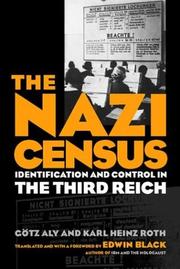| Listing 1 - 9 of 9 |
Sort by
|

ISBN: 9783100004215 3100004213 Year: 2008 Publisher: Frankfurt am Main : Fischer,
Abstract | Keywords | Export | Availability | Bookmark
 Loading...
Loading...Choose an application
- Reference Manager
- EndNote
- RefWorks (Direct export to RefWorks)
Nineteen sixty-eight, A.D --- Radicalism --- Student movements --- Students --- Mil neuf cent soixante-huit --- Radicalisme --- Mouvements étudiants --- Etudiants --- History --- Political activity --- Histoire --- Activité politique
Book
ISBN: 9783596193318 3596193311 Year: 2017 Publisher: Frankfurt am Main Fischer Taschenbuch
Abstract | Keywords | Export | Availability | Bookmark
 Loading...
Loading...Choose an application
- Reference Manager
- EndNote
- RefWorks (Direct export to RefWorks)
Geschichtsschreibung. --- Sozialgeschichte. --- Politisches Bewusstsein --- Wissenschaftler --- Drittes Reich --- Nationalsozialistisches Verbrechen --- Vergangenheitsbewältigung. --- Anpassung --- Kollektivismus --- Bevölkerung. --- Geschichte 1945-2015. --- Geschichte 1933-1945. --- Deutschland
Book
ISBN: 9783100004284 Year: 2017 Publisher: Frankfurt am Main : S. Fischer,
Abstract | Keywords | Export | Availability | Bookmark
 Loading...
Loading...Choose an application
- Reference Manager
- EndNote
- RefWorks (Direct export to RefWorks)
" Der Holocaust ist nicht allein aus der deutschen Geschichte heraus erkläbar. Sowohl in West - als auch in Osteuropa hatte die Judenfeind - schaft seit 1880 sprunghaft zugenommen - angetrieben von Nationalismus und sozialen Krisen. Ohne die Schuld der deutschen Täter zu mindern, zigt der Historiker Götz Aly, wie Rivalität und Neid, Diskriminierung und Pogrome vielerorts dazu beigetragen haben, den Boden für Deportationen und Morde zu bereiten. Erstmals wird so der moderne Antisemitismus als grenzüberschreitendes Phänomen dargestellt und damit eine neue, umfassende Perspektive auf die europäischen Vorgeschichten eröffnet, die zum Holocaust beitrugen." "Wie kam es dazu, dass seit dem Ende des 19. Jahrhunderts der Antisemitismus in ganz Europa zunahm? Es war, wie Götz Aly beschrebt, eine Zeit, in der die Gesellschaften neue Bildungs - und Aufstiegschancen eröffneten, die vor allem von den jüdischen Minderheiten genutzt wurden. Zugleich strebten die jungen Nationalstaaten, insbesondere im Osten, nach ethnischer Homogenität. Beide Faktoren führten seit 1880 zu wachsender Diskriminierung, Verfolgung und Gewalt gegen Juden, sei es in Griechenland oder Ungarn, in Litauen oder Polen. Als schliesslich während des Zweiten Weltkriegs die deutschen Besatzer damit begannen, die Juden zu ermorden, verfügten sie zwar über die Tatherrschaft, doch sie hatten auch Helfer. Der Wunsch, den Nationalstaat zu festigen unz sozialpolitische Fortschritte für die Mehrheitsbevölkerung durchzusetzen, sowie die Versuche, das eigene Volk ethnischrassisch zu definieren - all das zeigt Götz Aly in einer scharfsinnigen Analyse als Faktoren, die den Mord an den europäischen Juden begünstigten. Ein grosses Buch, das zentrale Elemente zum Verständnis des Geschehens zusammenführt - darunter Aspekte, die sowohl für den Zivilisationsfortschritt wie für den Zivilisationsbruch stehen."
Antisemitism --- Jews --- History --- Persecutions
Book
ISBN: 3455083668 Year: 1991 Publisher: Hamburg : Hoffmann und Campe,
Abstract | Keywords | Export | Availability | Bookmark
 Loading...
Loading...Choose an application
- Reference Manager
- EndNote
- RefWorks (Direct export to RefWorks)
Holocaust, Jewish (1939-1945) --- National socialism --- Holocauste, 1939-1945 --- Nazisme --- Causes --- Germany --- Allemagne --- Ethnic relations --- Politics and government --- Population policy. --- Relations interethniques --- Politique et gouvernement --- Politique démographique
Book
ISBN: 9782081330160 Year: 2014 Publisher: Paris : Flammarion,
Abstract | Keywords | Export | Availability | Bookmark
 Loading...
Loading...Choose an application
- Reference Manager
- EndNote
- RefWorks (Direct export to RefWorks)
A l'automne 1939 commence le programme d'euthanasie des personnes déficientes morales et physiques, décrété par Hitler, qui est étendu en 1940 aux délinquants et aux inaptes au travail. Des objectifs étaient fixés, de l'ordre du millième de la population. L'auteur pose la question des valeurs morales et montre comment l'assentiment général a encouragé les nazis à transposer ce processus aux Juifs. ©Electre 2015
Euthanasia --- People with disabilities --- World War, 1939-1945 --- Euthanasie --- Handicapés --- 2ème guerre mondiale --- History --- Nazi persecution --- Atrocities --- Histoire --- Persécutions nazies --- Atrocités
Book
ISBN: 9783103971965 3103971966 Year: 2023 Publisher: Frankfurt am Main : S. Fischer,
Abstract | Keywords | Export | Availability | Bookmark
 Loading...
Loading...Choose an application
- Reference Manager
- EndNote
- RefWorks (Direct export to RefWorks)
"Unnachahmlich treffsicher nimmt der Historiker Götz Aly den keineswegs immer »vorbildlichen« Umgang der Deutschen mit ihrer nationalsozialistischen Vergangenheit in den Blick: Oft ist von »den Tätern« die Rede, wenn es um die NS-Verbrechen geht, von »der SS« oder »den Nationalsozialisten«. Doch es waren Hunderttausende Deutsche, die aktiv Menschheitsverbrechen ungeheuren Ausmaßes begingen, und viele Millionen, die diese billigten, zumindest aber geschehen ließen.Götz Aly setzte sich in seinen Reden der vergangenen Jahre, von denen die wichtigsten in diesem Band versammelt sind, immer wieder mit den vielfältigen Praktiken auseinander, die Schuld auf möglichst kleine Gruppen und Unpersonen abzuschieben. Doch auch wenn sich mancher dagegen sperrt, so zeigt Götz Aly, es bleibt »Unser Nationalsozialismus«. Seine Maxime lautet: Die Vergangenheit nicht »bewältigen«, sondern vergegenwärtigen. So lässt sich daraus lernen.»Götz Aly (hat) uns vor Augen geführt, dass kein deutscher Staatsbürger sich heute davon freisprechen kann, vom Holocaust möglicherweise profitiert zu haben. Es bleibt die Schuld, die von allen beglichen werden muss.« Patrick Bahners zur Verleihung des Geschwister-Scholl-Preises 2018 an Götz Aly."
Holocaust, Jewish (1939-1945) --- World War, 1939-1945 --- National socialism. --- Collective memory --- Antisemitism. --- Nazisme. --- Mémoire collective --- Guerre mondiale, 1939-1945 --- Antisémitisme. --- Holocauste, 1939-1945. --- National Socialism. --- antisemitism. --- Antisemitism --- National socialism --- 1939-1945 --- Germany
Book
ISBN: 9781250170170 Year: 2020 Publisher: New York : Metropolitan Books, Henry Holt and Company,
Abstract | Keywords | Export | Availability | Bookmark
 Loading...
Loading...Choose an application
- Reference Manager
- EndNote
- RefWorks (Direct export to RefWorks)
"From the award-winning historian of the Holocaust, the first book to move beyond Germany's singular crime to the collaboration of Europe as a whole. The Holocaust was perpetrated by the Germans, but it would not have been possible without the assistance of thousands of helpers in other countries: state officials, police, and civilians who eagerly supported the genocide. If we are to fully understand how and why the Holocaust happened, Götz Aly argues in this groundbreaking study, we must examine its prehistory throughout Europe. We must look at countries as far-flung as Romania and France, Russia and Greece, where, decades before the Nazis came to power, a deadly combination of envy, competition, nationalism, and social upheaval fueled a surge of anti-Semitism, creating the preconditions for the deportations and murder to come. In the late nineteenth century, new opportunities for education and social advancement were opening up, and Jewish minorities took particular advantage of them, leading to widespread resentment. At the same time, newly created nation-states, especially in the east, were striving for ethnic homogeneity and national renewal, goals which they saw as inextricably linked. Drawing upon a wide range of previously unpublished sources, Aly traces the sequence of events that made persecution of Jews an increasingly acceptable European practice. Ultimately, the German architects of genocide found support for the Final Solution in nearly all the countries they occupied or were allied with. Without diminishing the guilt of German perpetrators, Aly documents the involvement of all of Europe in the destruction of the Jews, once again deepening our understanding of this most tormented history"
Antisemitism --- Jews --- Holocaust, Jewish (1939-1945) --- History --- Persecutions --- Europe --- Ethnic relations.

ISBN: 1592132596 1592131999 9781592131990 Year: 2004 Publisher: Philadelphia : Temple University Press,
Abstract | Keywords | Export | Availability | Bookmark
 Loading...
Loading...Choose an application
- Reference Manager
- EndNote
- RefWorks (Direct export to RefWorks)
"The Nazi Census documents the origins of the census in modern Germany, along with the parallel development of IBM machines that helped first collect data on Germans, then specifically on Jews and other minorities. Gotz Aly and Karl Heinz Roth begin by examining the history of statistical technology in Germany, from the Hollerith machine in the 1890s through the development and licensing of IBM punch-card technology. Aly and Roth explain that census data was collected on non-Germans in order to satisfy the state's desire to track racial groups for alleged security reasons. Later this information led to disastrous results for those groups and others that were tracked in similar ways. Ultimately, as Gotz Aly and Karl Heinz Roth point out in this short, rigorously researched book, the techniques the Nazis employed to track, gather information, and control populations initiated the modern system of citizen registration. Aly and Roth argue that what led to the devastating effects of the Nazi census was the ends to which they used their data, not their means. It is the employment of methods of collection that the authors examine historically as it applies to the Nazi regime, and also the way contemporary methods of classification and control still affect the modern world. With a riveting Introduction and translation from Edwin Black, NYT bestselling author of IBM and the Holocaust."
Germany --- Census, 1939. --- Statistical services --- History

ISBN: 3596137721 Year: 1998 Publisher: Frankfurt am Main : Fischer,
Abstract | Keywords | Export | Availability | Bookmark
 Loading...
Loading...Choose an application
- Reference Manager
- EndNote
- RefWorks (Direct export to RefWorks)
National socialism --- Holocaust, Jewish (1939-1945) --- World War, 1939-1945 --- Nazisme --- Holocauste, 1939-1945 --- 2ème guerre mondiale --- Causes --- Atrocities --- Atrocités --- Germany --- Allemagne --- Politics and government --- Politique et gouvernement --- 2ème guerre mondiale --- Atrocités --- Nazism --- Authoritarianism --- Fascism --- Nazis --- Neo-Nazism --- Totalitarianism --- Third Reich, 1933-1945
| Listing 1 - 9 of 9 |
Sort by
|

 Search
Search Feedback
Feedback About UniCat
About UniCat  Help
Help News
News